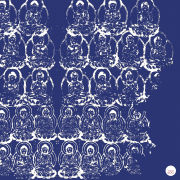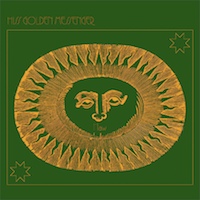

Rivers flood broad expanses of the Southern imagination. The mythic Mississippi rolls through literature, our watery national spine, by turns torpid and apocalyptic. But there are countless intimate tributaries and every Southerner knows one. Flowing water provides blessed relief in summer, spiritual cleansing and profane recreation. If you grew up messing around in creeks and rivers, you pushed through thick, brown water past insect skaters skimming the surface in sunny pools -- and learned that the cottonmouth waited on the shady bank. Haw, recently released by Hiss Golden Messenger, principally songwriter M.C. Taylor and producer/musician Scott Hirsch, is named for for one of those personal rivers, close by Taylor's former North Carolina home. And it's just one of a handful of recent HGM recordings, including a solo/band split album (Lord I Love the Rain), an expansive full-band record (Haw), and a collaboration with New York guitar phenomenon Steve Gunn (Golden Gunn). All offer rich, verdant depths where the serpent awaits the unwary.
HGM's musical output arrives as a stream, in improbable abundance. Just as 2010's Bad Debt preceded 2011's Poor Moon, Lord I Love the Rain (JellyFant) appeared a few months before Haw (Parade of Bachelors). Bad Debt shared several songs with Poor Moon (and one key song with Haw) and it presents Taylor alone, settling in to the language and emotions that would shape the breakthrough Poor Moon. Lord... is different and more varied, if still something of a workbook. Lord...'s acoustically raw first side (it was released in limited edition vinyl only) opens with Taylor's arresting "Karen's Blues" and includes a slashing solo version of Poor Moon's "Westering." The second side's full-band tracks include covers of Michael Hurley and Ronnie Lane songs, and "Born on a Crescent Moon," a six-minute jam with eastern overtones, a musical thought revisited on Haw and Golden Gunn.

Lord... 's duality plays lone introspection against full-throttle experiments, the music inextricably bound but different in intent and effect -- an x-ray shadowing Kodachrome. The album's notes include a short story/ dreamscape from fellow folk explorer Nathan Salsburg. Describing an attic party, and, indirectly, the record's diverse music, he writes, "The mirror is a riot of reflections; some dawdle, some stop, some stay. Stay. Music plays." Around the same time, Paradise of Bachelors released a split 45 (available on iTunes and Spotify) of HGM playing label mates Elephant Micah's lovely "My Cousin's King" and Elephant Micah playing HGM's sturdy "Balthazar's Song," which previously appeared on both Bad Debt and Poor Moon. Both worthy songs given worthy renditions, and either could have ended up on the other's album without raising an eyebrow.
Poor Moon was a bracing slap upside the head. Musically recalling and combining traditional song forms without falling into pastiche or parody, Taylor's songs starkly rendered a struggle for the soul in Biblical language and rhythms. Haw lowers its gaze and broadens the musical landscape, finding the eternal in the earthbound, homely concerns of work and family. From the first chords of opener "Red Rose Nantahala," Taylor insists on release, on an individual claim to happiness. "Sufferer (Love My Conquerer)" questions whether acceptance brings release or submission, and if, by learning to love the inevitable, we shake off the bonds of fear. Even the record's most explicit Biblical reference in "Busted Note" is grounded in work, as the chorus echoes Jesus's appeal to the Galilee fishermen to cease their worldly labors and become fishers of men. None of this is heavy going: where Poor Moon was urgent, Haw feels comfortable and confident. There are celebrations here as well as dark nights of the soul. As Haw was being written and recorded, both Taylor and Hirsch told me it was going to be a "dark" record. Taylor still thinks so. But I hear reassurance: though our time is short and struggles long, we cling hard to the dailyness of family and the children of our joy.

Haw is also musically generous, with Hirsch, who handles the recording, finding space for ambient sounds from the Southern night and the contributions of regular HGM drummer Terry Lonergan, the Black Twig Pickers' Nathan Bowles, Megafaun's Phil Cook and guitarist William Tyler, a frequent touring partner with HGM, whose biting Telecaster solos push some Haw songs into classic country-rock territory. (Hirsch recorded Haw in Taylor's in-laws' house; its clarity, warmth and relaxed pocket should inspire other musicians to abandon the studio and make a beeline for Mom's living room). There is a taut balance between Taylor's songwriting and the band's support. The dawdling strum of "Cheerwine Easter" dissolves into a long, probing saxophone solo by Bobby Crow that is as fully expressive as Taylor's vocal, but of an additional idea. The string arrangements in "Sufferer..." and "Devotion" offer a modal counterpoint that could as comfortably live in Eastern Europe as North Carolina; they give the song's folk foundations a broader perspective and suggest that many around the world have walked in chains. I've begun to see the full-band recordings, Poor Moon and Haw, as a spirited family discussion between Taylor and his musical brothers. While Taylor provides the thesis, Hirsch and the band comment, question, amplify, remark and contest; the songs thrive in the dialogue.
Golden Gunn should be an AM/FM preset on all bronze 1977 Mercury Cougars: it's the soundtrack for a luxury ride, with plenty of power, but gone kind of seedy. Aviator shades highly recommended. On this limited release for Record Store Day 2013 (listen on Spotify), a quartet of Taylor, Hirsch, HGM drummer Lonergan and New York-based guitarist Steve Gunn lay down a mostly instrumental set that can slink out of Memphis on a bass-driven blaxploitation groove ("From a Lincoln Continental") and arrive dusty and broke in Bakersfield ("Let Me Shine (Deathhouse))." Gunn, currently touring as both opening act and guitarist in Kurt Vile's Violators, expands the HGM geography as far west as Clarence White's Nashville West and as far east as his evolving take on finger-picked blues ragas. Gunn's slide and electric playing sits nicely atop a looser version of HGM melody and arrangements, and continues HGM's association with some of the brightest guitarists reworking traditional forms. (Gunn has a breakthrough record of his own,
The Haw is one of those intimate Southern rivers, a small tributary of the Cape Fear. The Nantahala passes through steep gorges in the Smokies, creating thick summertime mists pierced only by the noontime sun. Whether contemplating timeless rivers informed the music or not, the references ground the album in the physicality and specificity Taylor adds to the songs on Haw. All of HGM's recent records map the restless imaginations of a songwriter and his musical brethren at full flood of creativity.
Photo: Harlan Campbell